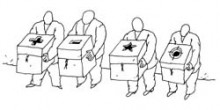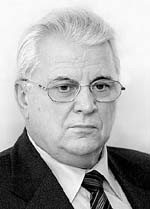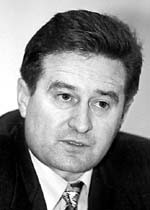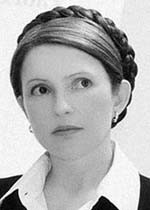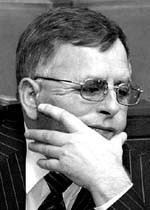The year 2003 proved difficult for the Ukrainian politicians — against the backdrop of certain political successes in the international arena, domestic political strife only intensified. It was a year of lasting discord in Verkhovna Rada. Yet, despite the opposition’s desperate attempts to obstruct the work of the parliament at the most decisive moments, the majority still managed to make political decisions from time to time.
It also proved a difficult year for the Yanukovych government, its two major mistakes being the grain crisis and situation with medicines, according to President Kuchma. The cabinet also experienced several personnel changes. On the bright side, the government reported the highest macroeconomic indicators in years and maintained a more or less stable relationship with Verkhovna Rada, which culminated in the signing of the December 25 political pact that created a parliamentary-government coalition. As suggested by opinion polls, 2003 was a year of soul-searching and revelations. But most importantly, it did not deflate our hopes. Simultaneously, the outgoing year has faced the country with a difficult choice — a choice of the quality of our state in particular and of politics in general; a choice among the Russian, Georgian and similar scenarios and our own Ukrainian scenario; a choice between unity and ominous separatist trends that clearly revealed themselves in Donetsk.
According to The Day’s experts and regular contributors, the year 2004 will decide Ukraine’s destiny for the next ten to fifteen years. It is up to us whether it becomes a year of the dirtiest electoral tactics or a year that will see the strengthening of Ukraine’s geopolitical choice and the rallying of Ukraine’s political elite around the country’s national interests. What kind of leaders will be in demand by the people after the elite and society at large cross the Rubicon of political reform? Are our politicians ready to brave the practical results of the hard-line policy the choice of which Russia confirmed in its December parliamentary elections? While we reflect on the outgoing year, we expect to get answers to these and other questions in 2004. The Day has offered the leaders of Ukraine’s political forces to sum up the results of 2003.
Leonid KRAVCHUK, SDPU(o) leader:
“The positive thing was that Ukraine’s economy continues to expand. And this is the most important thing despite all the contradictions and complications the outgoing year has seen. I see it as evidence that we have passed the most difficult point where we would always find ourselves in a difficult situation. Of course, we face a long road ahead, but this road has been cleared of obstacles. This applies to the economy.
“In the political domain, we — at least the parliamentary majority — have all agreed that political reform is needed in the country and shown readiness to work toward implementing this reform in keeping with the Constitution. I’m convinced that without the political reform there will be no accord among the government, parliament, and president. The angles of this triangle must act in concert and not obstruct one another. But this is possible only if the Constitution is amended.
“Among the negatives was the continuation of political confrontation. Corruption became more pronounced.
“The Tuzla conflict was a bad sign in the relationship between our two countries that are strategic partners.
“In fact, this list is quite long. After all, in a society where over 60% of people are poor or very poor it is not difficult to find negatives.”
Stepan HAVRYSH, parliamentary majority coordinator:
“A good thing is that against all odds we have not strayed from the democratic course neither in the parliament nor in society at large. The heated debate over the political reform in December is further evidence that Ukraine has chosen its own national way of development. The year 2003 also brought us several pleasant surprises such as stability in Ukraine, which has ensured quite effective economic and social development on the whole. Another positive thing was that I for one felt free to speak my mind and could hear from my friends and colleagues what I wanted to hear.
“On the other hand, Ukraine’s political elite has confirmed that it is not always able to find a middle ground and often puts personal ambitions above the national interests. The lack of not only a consensus but also a broad compromise is the most unfortunate result of the outgoing year. I believe that all of this should develop into a joint vision of national development through the lens of national interests. I wish us all enough wisdom, inner strength, and national inner charisma that would enable us to join our efforts in developing our common Ukrainian home.
“As for the bad things, it was perhaps the bad weather, the fact that nature didn’t favor the high crop that we counted on so much. And, unfortunately, we lasted until the fall on minimum grain reserves, which brought Ukraine’s chernozem black soil under sharp discussion.
“The world changed significantly in 2003. While formerly even the smallest countries participated in the process of globalization and used their internal information space to fill it with ideas, and such ideas were heeded, then at the close of the year it became clear that we are following in the footsteps of the biggest superpower, the USA. This provides ample food for thought as to what the world will be like tomorrow. In my view, the wars that raged in the world last year made us realize one important thing: today there are no individual wars, but a war fought by the whole world.”
Yosyp VINSKY, SPU faction:
“The year 2003 showed stability and didn’t bring anything remarkable or epoch-making. That is, there were many good and bad things. Unfortunately, on the whole the situation in Ukraine stabilized at a negative mark. We registered no significant progress either in politics, the economy, or society. Of course, this is not to say that nothing good happened to anyone, for life is not without holidays. Someone was born, others got married, someone else bought an apartment or a car, and someone got a job.”
Yuliya TYMOSHENKO, BYuT leader:
“One can’t say that 2003 was a bad year. Precisely this year marked the beginning of the unification of opposition forces, which gives us hope of a victory in 2004 and a different life in the country. The negative thing is that, unfortunately, in 2003 Verkhovna Rada saw the formation of a quite consolidated team, the majority, which has in fact turned the work in the parliament into a farce. What is going on in Verkhovna Rada has nothing in common with reasonable legislative work. It is used to pushing through lobbyist laws that undermine the country’s economy and politics. This is no doubt a negative component of the previous political year. But each person despite his or her political affiliation had many bright moments connected with their families, love for their children, and communication with their friends. I sincerely wish that all the ignominy, shame, and trouble remain in the year 2003. I would like the next year to be the year of victory for all Ukraine. And this will happen only if we unite and win the presidential elections, if common sense prevails along with the patriotic forces and each citizen of Ukraine. Our team will dedicate the next year entirely to this goal.”
Viktor YUSHCHENKO, Our Ukraine leader:
“The most significant events of 2003 within the world context were no doubt the Iraq War and the looming terrorist threat. The world has realized that terrorism is the bane of the twenty-first century and a major threat to humanity.
“As for Ukraine, unfortunately, 2003 was yet another wasted year for Ukraine. The official foreign policy was determined exclusively by the instinct of self-preservation and pursuit of momentary and situational, but not strategic interests. It was a year of an inexpressive foreign policy; a year when national interests were surrendered; a year of failures and errors such as talk of possible operation of the Odesa-Brody pipeline in the reverse mode, exclusion of European partners from the project to create a gas transport consortium, strange haste with the creation of an incomprehensible structure hidden behind the acronym SES, and the Tuzla conflict. Those in power have not learned how to formulate and protect Ukraine’s national interests. For this the country is paying dearly: as before we are toying with European principles and not living according to them.
“Most Ukrainians will remember the year 2003 for higher prices for bread and utilities and a bungled agricultural policy, along with the precedent in Ukraine’s history when the majority reduced the minimum wage. This year the opposition met with unprecedented pressure from those in power. And, finally, the so-called constitutional reform, with the whole society being artificially drawn into the discussion of it. The motto of this political season was “Are you for the political reform?” Meanwhile, the most popular political aphorism no doubt was “Ukraine is not Russia.”
“Another significant event for me and, I believe, for the society at large was November 22, when we remembered the millions of innocent Ukrainians murdered during the horrible manmade famine of 1932-33. In those years, 25,000 people died each day. And I wanted to see 25,000 candles lit in Kyiv’s Mykhaylivska ploshcha near the Holodomor victims’ memorial as a sign of our remembrance and mourning. We urged Kyivans to come to the square. Perhaps on this day thousands of Ukrainians realized for the first time the scale and depth of the tragedy of their people. We witnessed an amazingly emotional and pure event. Unfortunately, even at such moments those in power could not muster the courage to say the word genocide in their assessment of the events of 1932-33.”
Petro PYSARCHUK, SDPU(o) faction:
“Within the global context, the most important thing is that we have managed to avert a full-scale military conflict in Iraq. As for Ukraine, one can name a series of important events beginning with the approval by Verkhovna Rada of the lyrics of our long-suffering anthem “Ukraine’s Has Not Yet Perished...” However, in my view, the most important thing is that we have managed to establish effective cooperation between the government and parliament despite all the politicking, lies, and mudslinging we have been amply treated to by certain people who call themselves oppositionists. We have launched the pension and tax reforms. For the first time in the years of independence the state budget was fulfilled 100%, and all its items, including social items, were funded in full. One should understand that the development of the economy is determined not by the president, but above all by the parliament and government along with the business environment. Thus I’m very pleased that despite the political confrontations caused by the forthcoming presidential elections we have managed jointly with the cabinet to ensure stability and gradual development in all the major economic spheres, thereby creating good preconditions for the development of Ukraine’s economy in 2004. The fact remains that we have one of the highest GDP growth rates in Europe. If we manage to preserve it for the next couple of years — and we must not only preserve it but double and triple it to catch up with smug and wealthy Europe — we will be able to say that Verkhovna Rada in it current makeup has fulfilled its historic duty to the people.”

